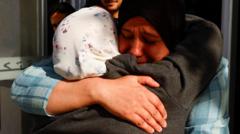Ten months after fleeing Gaza, a BBC correspondent recounts the harrowing experiences of family still trapped under bombardment. The emotional toll of separation and anxiety about loved ones’ safety is palpable, highlighting the struggles faced by many Gazans in exile as they confront guilt, loss, and political complexities in their quest for stability and peace.
The Weight of Exile: A Gazan Family's Emotional Struggle Amidst War

The Weight of Exile: A Gazan Family's Emotional Struggle Amidst War
A BBC correspondent shares the poignant story of their family's escape from Gaza as they grapple with guilt and helplessness over loved ones left behind in the conflict.
The sound of distant explosions fills the air as I walk through the bustling streets of Istanbul, my mind clouded by worry and guilt. It's been ten months since my family and I left Gaza, yet daily life feels like a surreal balancing act between seeking safety and mourning the loss of those trapped in a war zone. Just weeks ago, as we approached the anniversary of the conflict, we received a haunting video message from my wife’s cousin in Gaza: “The tanks are surrounding us and firing at us. These could be the last moments of our lives.” The anguish condemned us to a helpless vigil, hoping against hope for their survival.
My wife fell apart at the news, her uncle, aunts, and their families—26 relatives—facing the terrifying reality of bombardments. The Israeli army’s advances have intensified in recent months, resulting in unbearable losses. Our fears were confirmed with a voice note indicating that four family members, including her aunt Wafaa, were injured. Despite frantic calls to humanitarian organizations, help was slow; Wafaa's injuries proved fatal.
Back in Gaza, my father lives in a tent in Khan Younis, a city once bustling with life, now battered by airstrikes. Each call to him from Istanbul is burdened with guilt and sorrow. My escape was not a luxury all could afford. In November alone, over 100,000 Gazans found refuge in Egypt, but many more remain trapped, unable to pay for passage.
Now in Cairo, newly arrived exiles congregate in cafés, sharing stories and finding comfort in the moments of camaraderie. A traditional Palestinian song plays, rousing fond memories of home and the longing to return. Among them is Abu Anas Ayyad, a former businessman, who laments each Israeli missile as a personal loss. Despite his deep connection to Gaza, he refuses to return under Hamas rule, fearing for his children’s future.
Mahmoud Al Khozondr, once the proud owner of a famous hummus shop, shows me photos of his former life as he navigates the struggles of living in cramped conditions with his family. Education for his children remains elusive, overshadowed by the daily fight for basic necessities. “We lost everything back home, but we must rise again,” he insists, determined yet despondent.
Exile in Egypt may shield them from immediate threats, but life here is fraught with challenges. The authorities do not provide residency, complicating access to education and essential services. Many Gazans try to send remittances home, yet the costs are exorbitant, with a hefty percentage claimed by those profiting from the conflict, adding insult to injury.
In Turkey, my family and I wrestle with the aftermath of our escape. Our children, longing for the memories of their homeland, often reminisce about their lives in Gaza—their friends, our home, and the bittersweet recollections of happiness overshadowed by loss. The reality is stark: a war that still clings to our souls, erasing the timeline of our lives since that fateful day on October 7.
Physically we have escaped, but our hearts remain tethered to Gaza, saturated with a sadness that cannot easily fade. The dream of peace feels distant as we search for a way to heal, both for ourselves and for those still living in the chaos of war. The narrative of our lives has expanded beyond borders, yet the yearning for home remains, as does the hope—fervently rekindled—that one day, we may return.


















